Describe the differences between a board of nursing and a professional nurse association. Describe the geographic distribution, academic credentials, practice positions, and licensure status of members of the board for your specific region/area
Describe the differences between a board of nursing and a professional nurse association
Nursing is a very highly regulated profession. There are over 100 boards of nursing and national nursing associations throughout the United States and its territories. Their existence helps regulate, inform, and promote the nursing profession. With such numbers, it can be difficult to distinguish between BONs and nursing associations, and overwhelming to consider various benefits and options offered by each.
Both boards of nursing and national nursing associations have significant impacts on the nurse practitioner profession and scope of practice. Understanding these differences helps lend credence to your expertise as a professional. In this Assignment, you will practice the application of such expertise by communicating a comparison of boards of nursing and professional nurse associations.
You will also share an analysis of your state board of nursing.
To Prepare:
- Assume that you are leading a staff development meeting on regulation for nursing practice at your healthcare organization or agency.
- Review the NCSBN and ANA websites to prepare for your presentation.
The Assignment: (9- to 10-slide PowerPoint presentation)
Develop a 9- to 10-slide PowerPoint Presentation that addresses the following:
- Describe the differences between a board of nursing and a professional nurse association.
- Describe the geographic distribution, academic credentials, practice positions, and licensure status of members of the board for your specific region/area.
- Who is on the board?
- How does one become a member of the board?
- Describe at least one federal regulation for healthcare.
- How does this regulation influence delivery, cost, and access to healthcare (e.g., CMS, OSHA, and EPA)?
- Has there been any change to the regulation within the past 5 years? Explain.
- Describe at least one state regulation related to general nurse scope of practice.
- How does this regulation influence the nurse’s role?
- How does this regulation influence delivery, cost, and access to healthcare?
- Describe at least one state regulation related to Advanced Practice Registered Nurses (APRNs).
- How does this regulation influence the nurse’s role?
- How does this regulation influence delivery, cost, and access to healthcare?
Required Referances
Milstead, J. A., & Short, N. M. (2019). Health policy and politics: A nurse’s guide (6th ed.). Burlington, MA: Jones & Bartlett Learning.
- Chapter 4, “Government Response: Regulation” (pp. 57–84)
American Nurses Association. (n.d.). ANA enterprise. Retrieved September 20, 2018, from http://www.nursingworld.org
Bosse, J., Simmonds, K., Hanson, C., Pulcini, J., Dunphy, L., Vanhook, P., & Poghosyan, L. (2017). Position statement: Full practice authority for advanced practice registered nurses is necessary to transform primary care. Nursing Outlook, 65(6), 761–765. http://doi.org/10.1016/j.outlook.2017.10.002
Halm, M. A. (2018). Evaluating the impact of EBP education: Development of a modified Fresno test for acute care nursing. Worldviews on Evidence-Based Nursing, 15(4), 272–280. https://doi.org/10.1111/wvn.12291
National Council of State Boards of Nursing (NCSBN). (n.d.). Retrieved September 20, 2018, from https://www.ncsbn.org/index.
Neff, D. F., Yoon, S. H., Steiner, R. L., Bumbach, M. D., Everhart, D., & Harman J. S. (2018). The impact of nurse practitioner regulations on population access to care. Nursing Outlook, 66(4), 379–385. https://doi.org/10.1016/j.outlook.2018.03.001
Expert Answer and Explanation
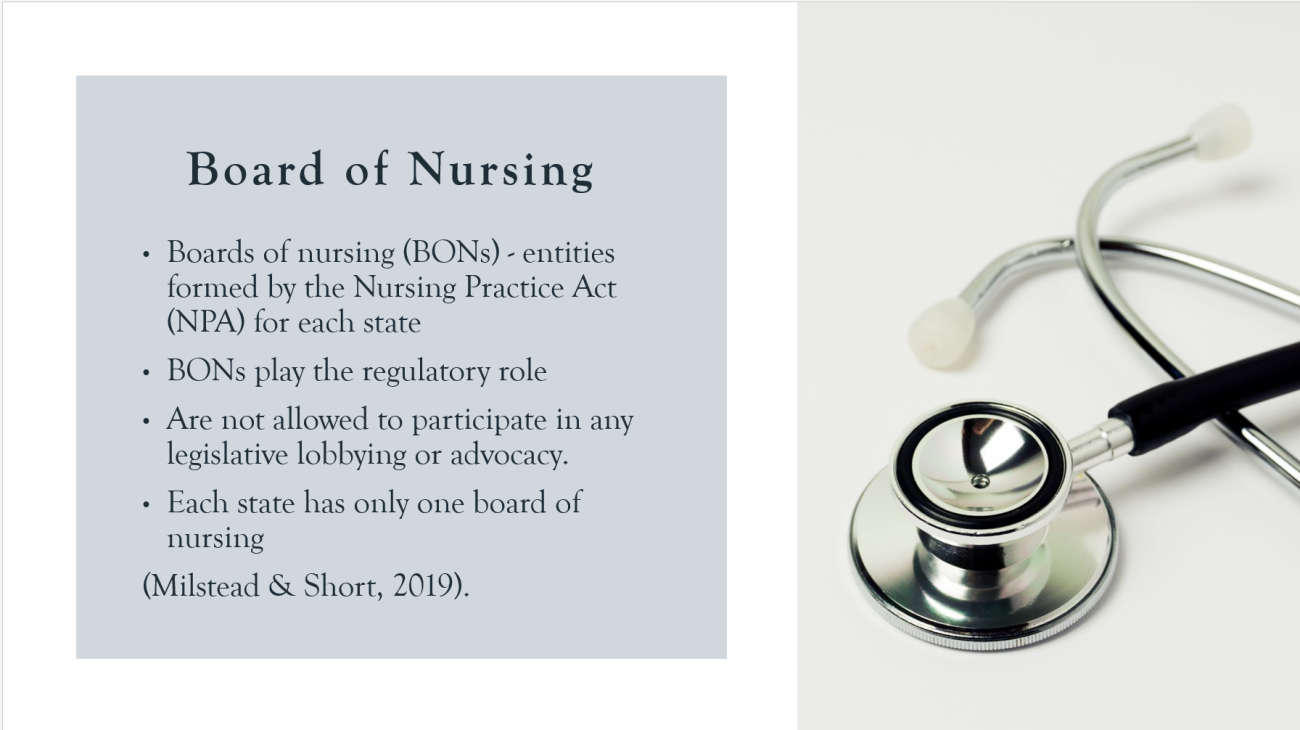
- Boards of nursing (BONs) are entities formed by the Nursing Practice Act (NPA) for each state in the United States. BONs specifically play the regulatory role and provides oversight in nursing practice in accordance with the NPA (Milstead & Short, 2019). BONs are not allowed to participate in any legislative lobbying or advocacy. BONs members are usually selected by the governor with participation of the state senate and input from other stakeholders in the healthcare industry. Each state has only one board of nursing.
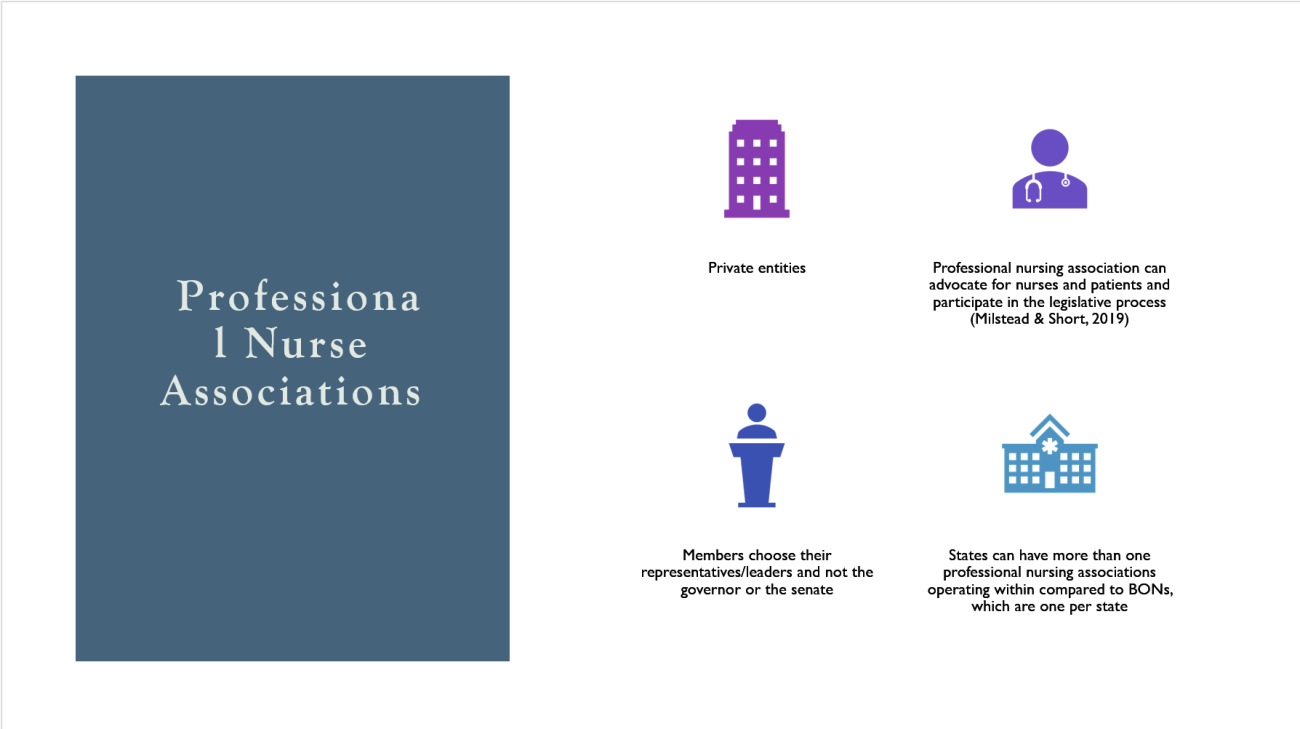
- Professional nurse associations on the other hand are private entities, with their membership being primarily nurses. There are different professional nursing associations each with a different mandate of spearheading the interests of nurses and patients. Unlike BONs, professional nursing association can advocate for nurses and patients and participate in the legislative process (Milstead & Short, 2019). The membership of the different associations chooses their representatives/leader of the respective associations and not the governor or the senate. States can have more than one professional nursing associations operating within compared to BONs, which are one per state.
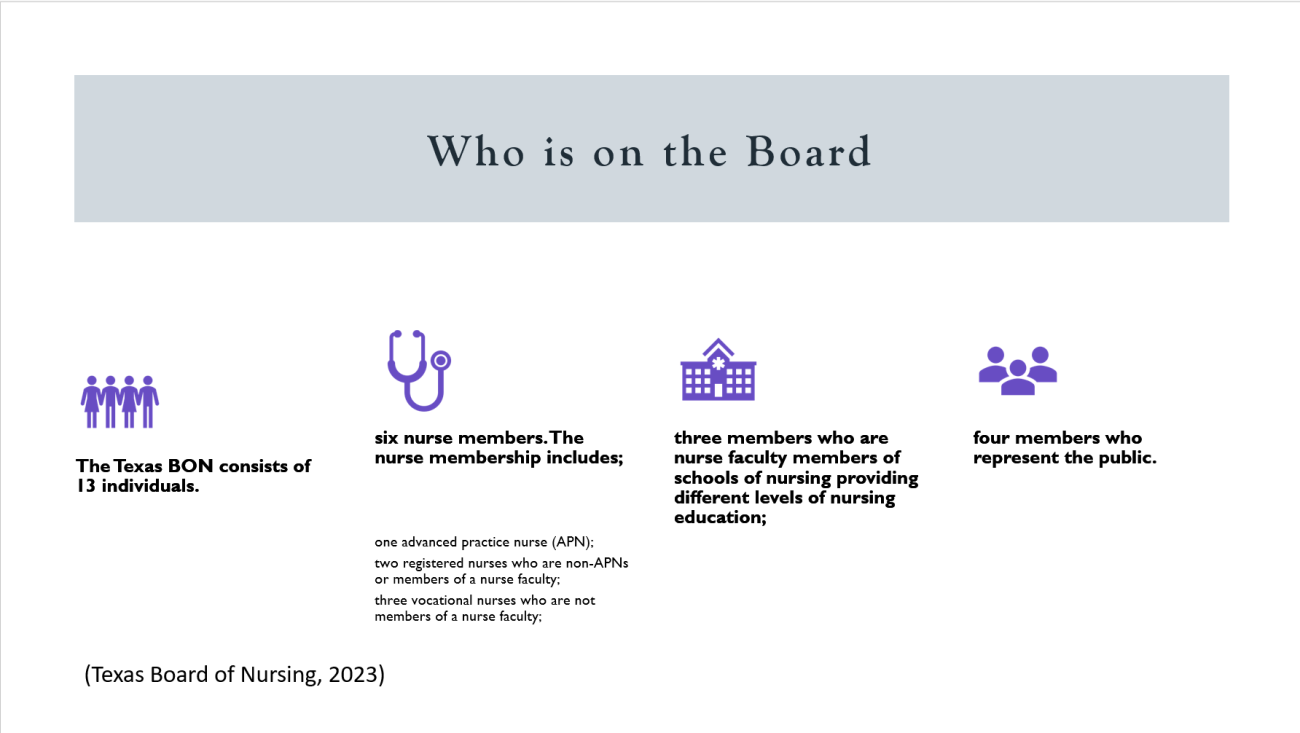
According to the Texas NPA, the membership of the Texas BON consists of 13 individuals appointed by the governor in consultation and consent of the senate. The membership includes;
- six nurse members. The nurse membership includes:
- one advanced practice nurse (APN);
- two registered nurses who are non-APNs or members of a nurse faculty; and
- three vocational nurses who are not members of a nurse faculty;
- three members who are nurse faculty members of schools of nursing providing different levels of nursing education:
- four members who represent the public.
(Texas Board of Nursing, 2023)
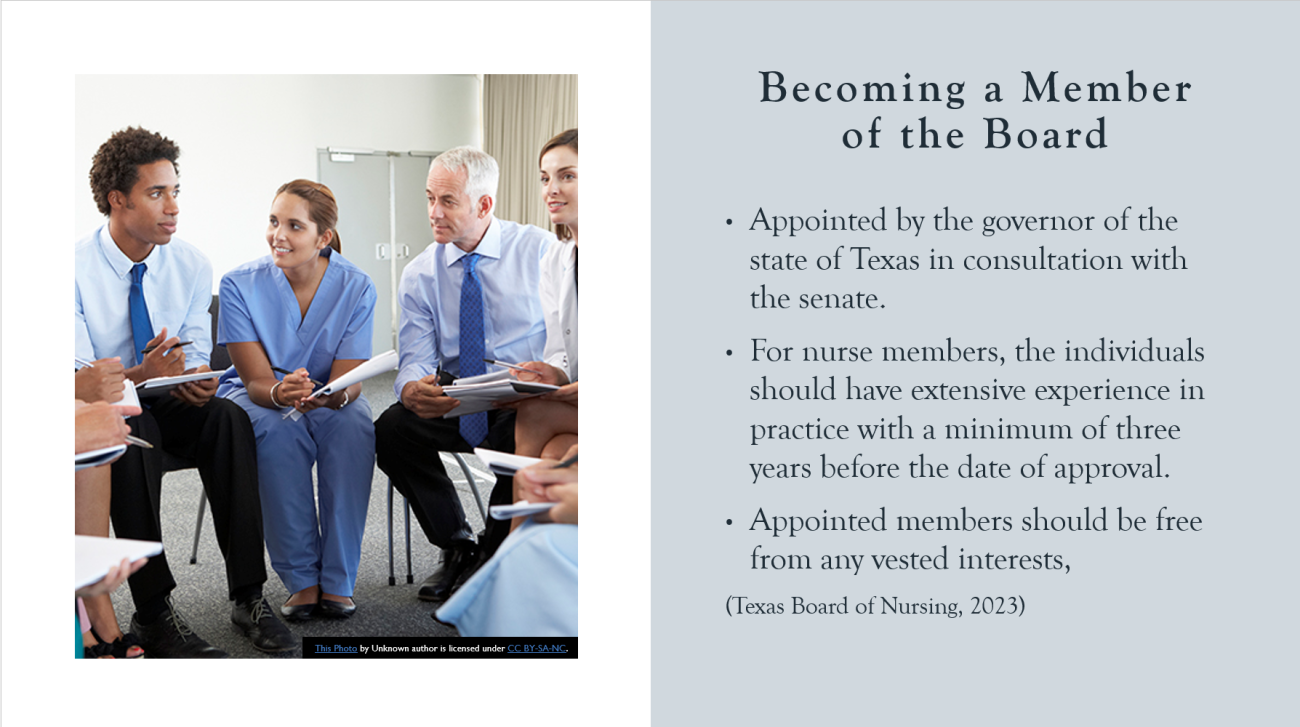
- For one to become a member of the board, they have to be appointed by the governor of the state of Texas in consultation with the senate.
- For nurse members, the individuals should have extensive experience in practice with a minimum of three years before the date of approval.
- Appointed members should be free from any vested interests, including current service in regulatory bodies or possession of businesses that offer healthcare services
(Texas Board of Nursing, 2023)
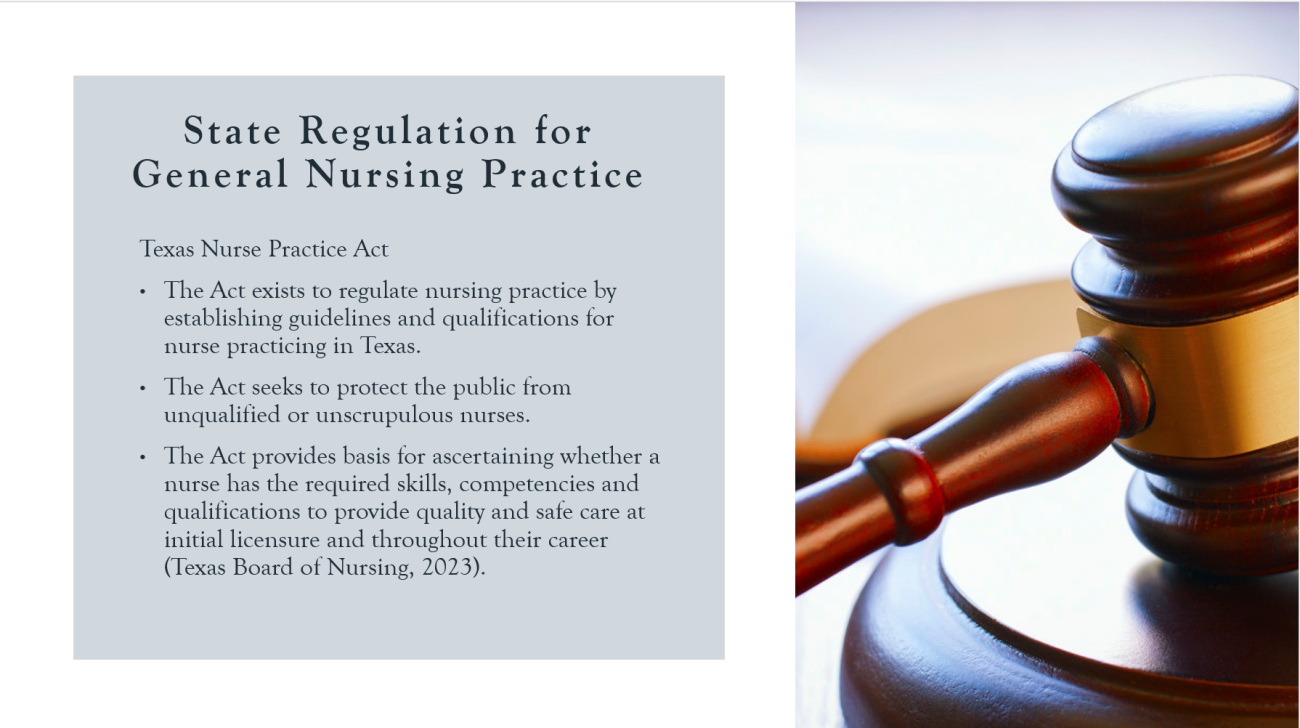
- The Texas Nurse Practice Act is one of the regulations that talks about the general scope of nursing practicing in Texas.
- The Act exists to regulate nursing practice by establishing guidelines and qualifications for nurse practice. The Act seeks to protect the public from unqualified or unscrupulous nurses who are a risk to the health, safety, and welfare of the citizens within the state board jurisdiction.
- The Act provides basis for ascertaining whether a nurse has the required skills and competencies and qualifications to provide quality and safe care at initial licensure and throughout their career (Texas Board of Nursing, 2023).
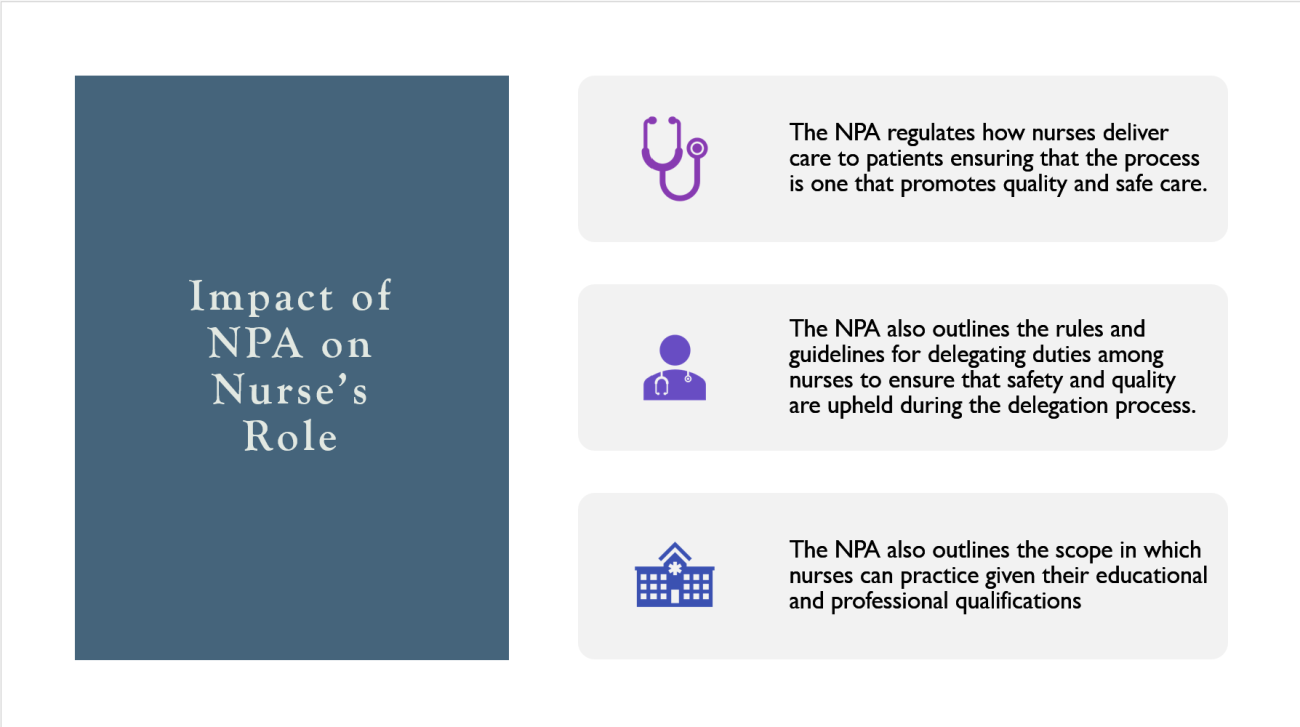
- In terms of delivery- the Texas NPA has significantly improved delivery, especially in terms of quality by preventing unqualified persons from providing care and putting patients at risk (Texas Board of Nursing, 2023)
- The NPA has also reduced healthcare costs by improving preventable adverse events that would have emerged from low quality care.
- The NPA has also enhanced access to care by encouraging uptake, which is as a result of enhanced quality of care.
- The NPA gives BONs powers to oversee care provision, which includes provision of culturally centered care free of discrimination in accordance with the nursing scope of practice.
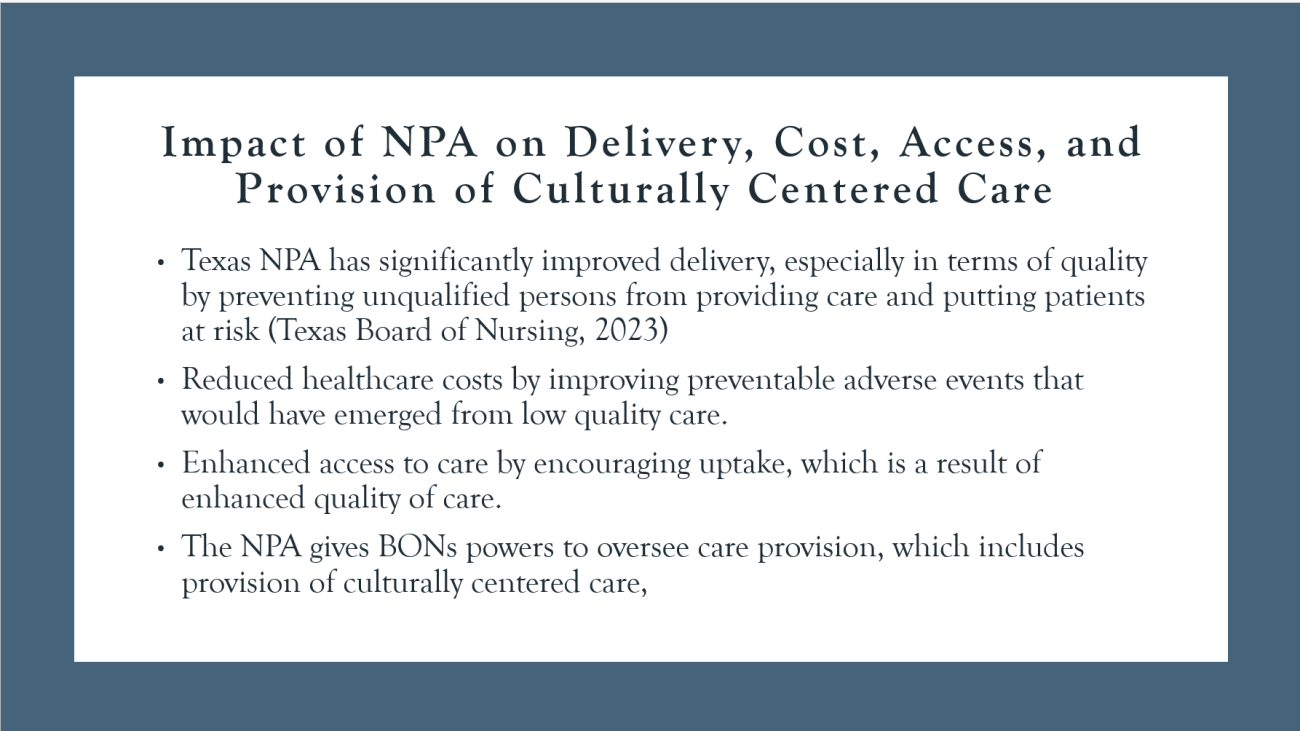
- One of the current regulatory frameworks that focuses on APRNs is the HEAL (Healthcare Expanded and Accessed Locally) Texas Act
- The Act aims to remove APRN practice barriers, and expand local options across the state, more so in underserved communities and rural areas.
- The bill clears the way for APRNs to serve patients more directly without the strict oversight rules currently in place.
(Hollis, 2023)
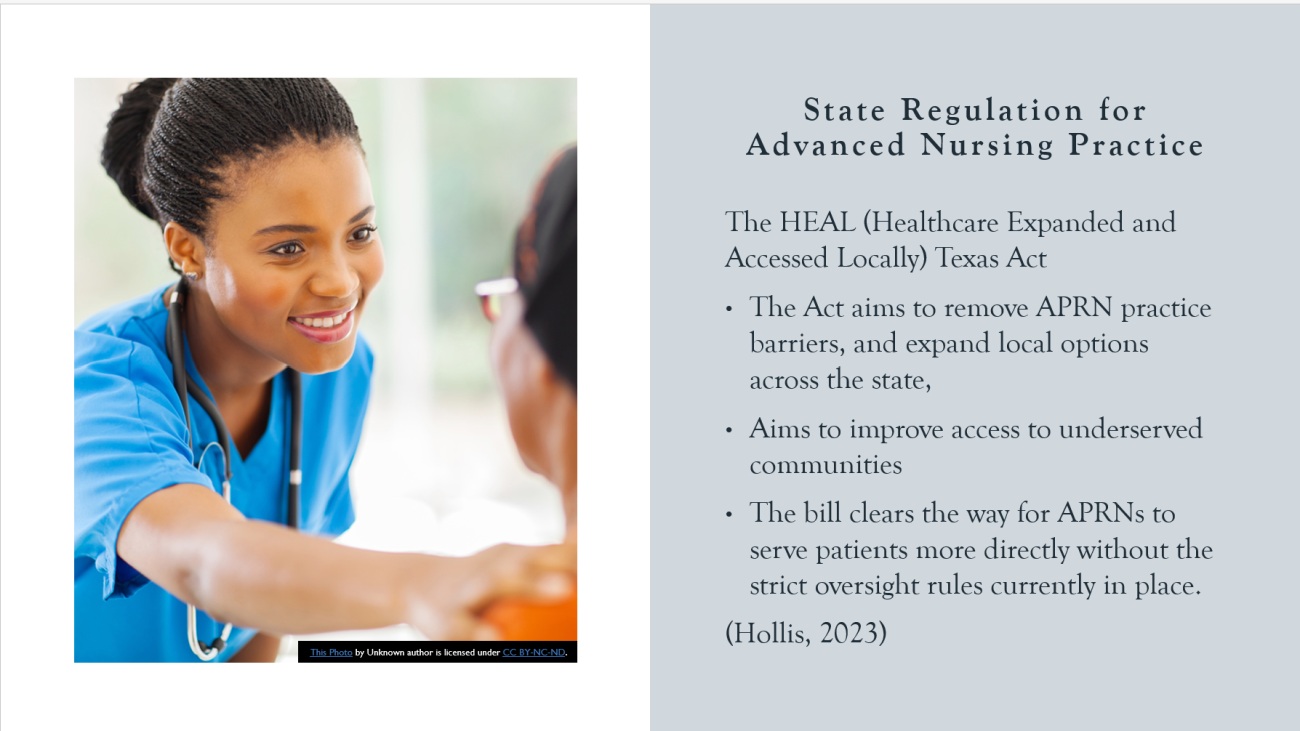
- The Act removes practice barriers for nurse practitioner allowing them to discharge care to the full extent of their training and education.
- This means that the scope of practice for nurse practitioners will be broader than it currently is.
- The regulation will make healthcare services more accessible and at an affordable cost due to availability of more healthcare providers servicing the community.
- The quality of healthcare delivery will also improve, especially with physicians having enough time to attend to complex patient issues.
(Hollis, 2023)
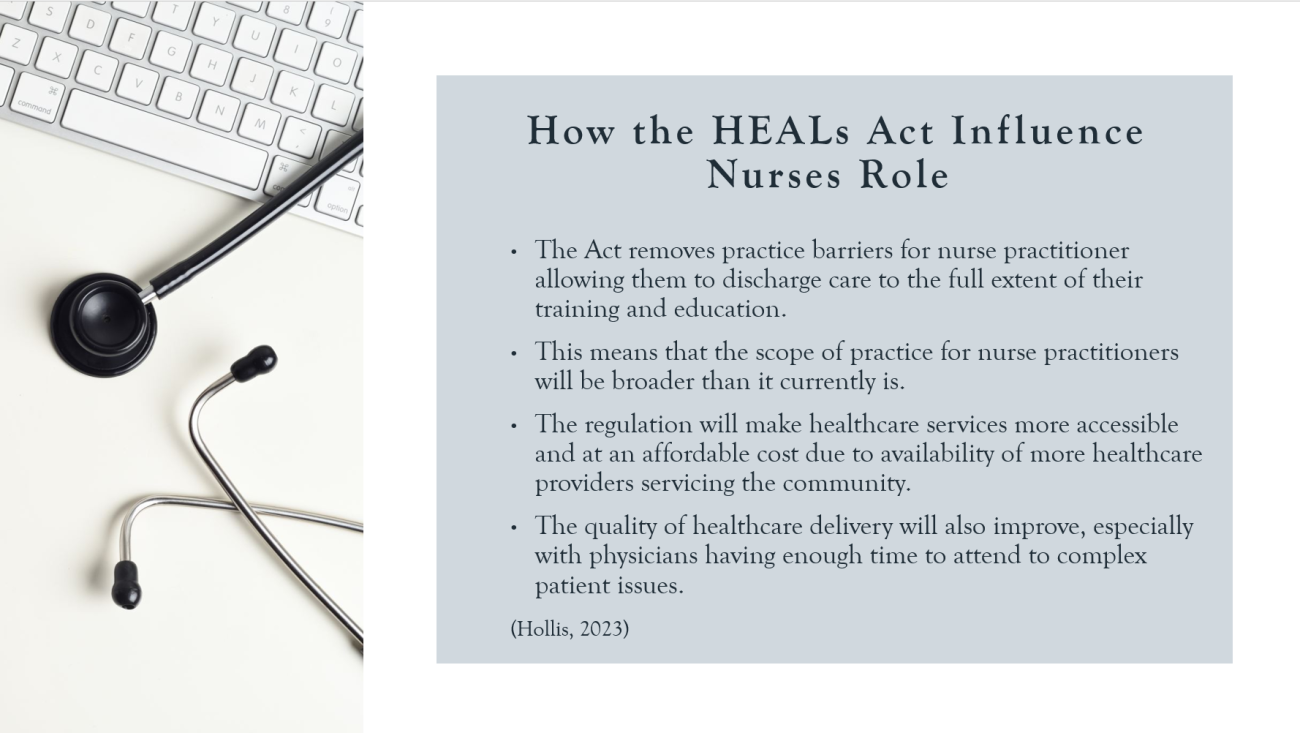
- The Act removes practice barriers for nurse practitioner allowing them to discharge care to the full extent of their training and education.
- This means that the scope of practice for nurse practitioners will be broader than it currently is.
- The regulation will make healthcare services more accessible and at an affordable cost due to availability of more healthcare providers servicing the community.
- The quality of healthcare delivery will also improve, especially with physicians having enough time to attend to complex patient issues.
(Hollis, 2023)
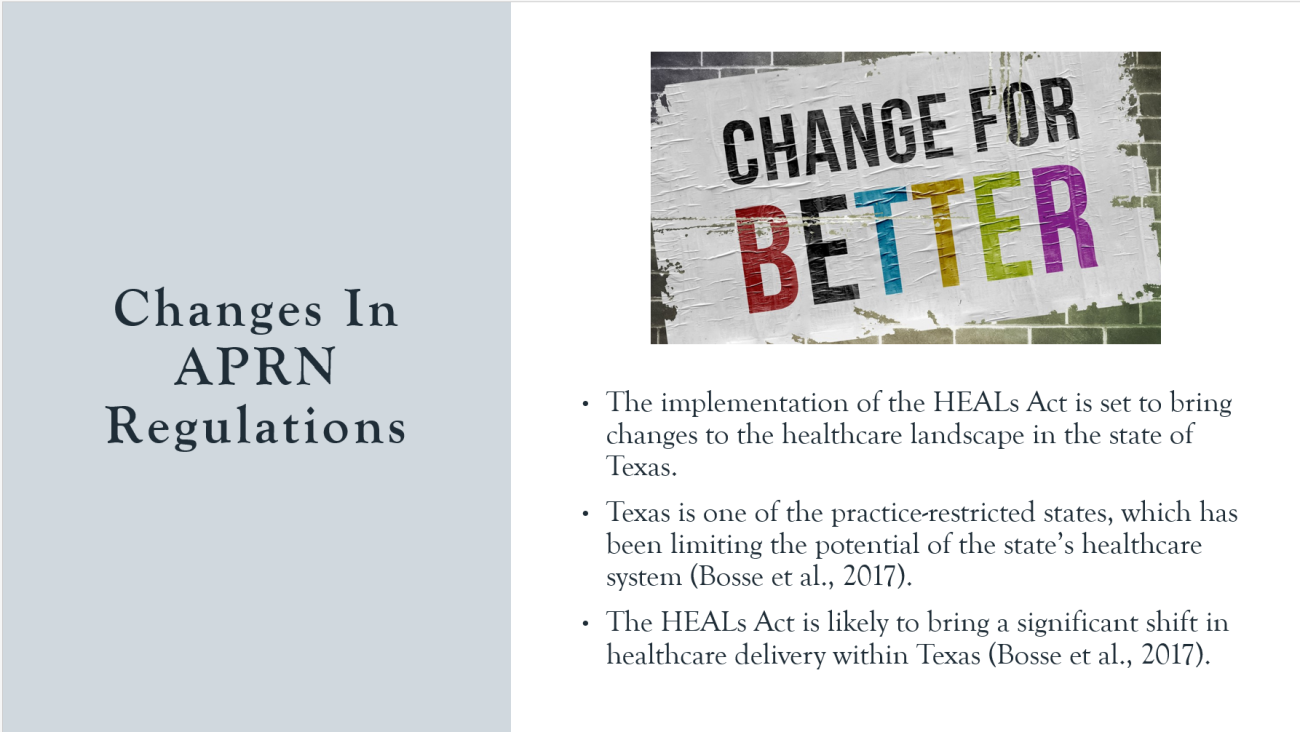
- The implementation of the HEALs Act is set to bring changes to the healthcare landscape in the state of Texas.
- For a long time, Texas has been regarded as one of the practice restricted states, which has been limiting the potential of the state’s healthcare system (Bosse et al., 2017).
- With the HEALs Act in place, we are likely to see a significant shift in healthcare delivery within the state, with better patient outcomes being a resulting consequence if the findings from other unrestricted states are anything to go by (Bosse et al., 2017).
References
- Bosse, J., Simmonds, K., Hanson, C., Pulcini, J., Dunphy, L., Vanhook, P., & Poghosyan, L. (2017). Position statement: Full practice authority for advanced practice registered nurses is necessary to transform primary care. Nursing Outlook, 65(6), 761–765. https://doi.org/10.1016/j.outlook.2017.10.002
- Hollis, M. (2023). Healthcare access bill allows full practice authority for nurse practitioners. American Association of Retired Persons. https://states.aarp.org/texas/healthcare-access-bill-allows-full-practice-authority-for-nurse-practitioners
- Milstead, J. A., & Short, N. M. (2019). Health policy and politics: A nurse’s guide(6th ed.). Jones & Bartlett Learning
- Texas Board of Nursing. (2023). Nursing Practice Act — Chapter 301. https://www.bon.texas.gov/npa1.asp.html
Place your order now for a similar assignment and get fast, cheap and best quality work written by our expert level assignment writers. Use Coupon Code: NEW30 to Get 30% OFF Your First Order
Use Coupon Code: NEW30 to Get 30% OFF Your First Order
FAQs:
What is the difference between a board of nursing and a professional nurse association?
A Board of Nursing (BON) and a Professional Nurse Association serve distinct roles in the nursing profession, focusing on regulation and professional development, respectively.
Key Differences:
| Feature | Board of Nursing (BON) | Professional Nurse Association |
|---|---|---|
| Purpose | Regulates nursing practice to protect public safety | Advocates for nurses’ professional growth and interests |
| Authority | Government agency (state or national level) | Membership-based organization |
| Functions | Issues licenses, enforces nursing laws, disciplines violations | Provides networking, education, and policy advocacy |
| Membership | Mandatory for licensed nurses | Voluntary for nurses interested in professional development |
What is the difference between the State Board of Nursing and the ANA?
Difference Between the State Board of Nursing and the ANA
The State Board of Nursing (BON) and the American Nurses Association (ANA) have different roles in the nursing profession, with the BON focusing on regulation and the ANA advocating for nurses’ interests.
Key Differences:
| Feature | State Board of Nursing (BON) | American Nurses Association (ANA) |
|---|---|---|
| Purpose | Regulates nursing practice to ensure public safety | Advocates for nurses’ rights, education, and workplace conditions |
| Authority | Government agency (state level) | Professional membership organization |
| Functions | Issues nursing licenses, enforces laws, disciplines violations | Provides resources, lobbying, professional development, and networking |
| Membership | Mandatory for practicing nurses | Voluntary for nurses seeking advocacy and career growth |
What is the purpose of the Board of Nursing?
Purpose of the Board of Nursing
The Board of Nursing (BON) is a government agency responsible for regulating the nursing profession to ensure public safety and high standards of care.
Key Responsibilities:
✅ Licensing Nurses – Issues and renews nursing licenses.
✅ Enforcing Nursing Laws – Ensures compliance with state regulations.
✅ Disciplinary Actions – Investigates complaints and takes corrective measures.
✅ Approving Nursing Programs – Evaluates and accredits nursing education programs.
✅ Setting Practice Standards – Establishes rules to uphold quality nursing care.
Each state has its own State Board of Nursing that operates under government authority.

Dan Palmer is a dedicated academic writing specialist with extensive experience supporting nursing students throughout their educational journey. Understanding the unique challenges faced by nursing students who balance demanding clinical rotations, family responsibilities, and rigorous coursework, Dan provides professional assignment assistance that helps students maintain academic excellence without compromising their other commitments.
With a comprehensive understanding of nursing curriculum requirements and academic standards, Dan delivers high-quality, thoroughly researched assignments that serve as valuable learning resources. His expertise spans various nursing disciplines, including clinical practice, healthcare ethics, patient care management, and evidence-based research.
Dan’s approach combines meticulous attention to detail with a commitment to timely delivery, ensuring that busy nursing students receive the support they need when they need it most. His professional assistance has helped countless nursing students successfully navigate their academic programs while maintaining their professional and personal responsibilities.
Committed to academic integrity and excellence, Dan Palmer continues to be a trusted resource for nursing students seeking reliable, professional assignment support.
